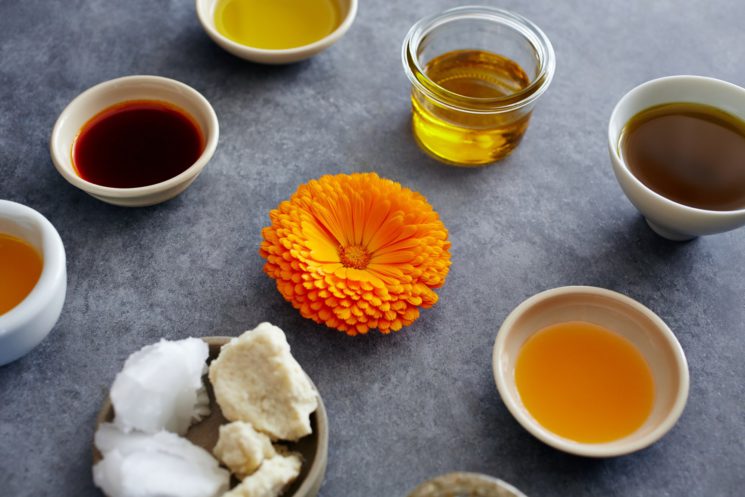 They come from small red berries and evergreen forests, but these skin-care ingredients can go head-to-head with their lab-grown peers. Meet the natural wonders that are generating buzz — and transforming complexions.
They come from small red berries and evergreen forests, but these skin-care ingredients can go head-to-head with their lab-grown peers. Meet the natural wonders that are generating buzz — and transforming complexions.
Manuka Honey
You’ve probably seen headlines like: “I Washed My Face With Honey and It Was the Most Amazing Thing Ever.” Though we don’t actually drizzle the stuff on our face as if it’s a parfait, honey as a skin-care ingredient — specifically manuka honey from New Zealand or Australia — is, in fact, amazing. Unlike the antioxidants in other honey varieties, “the ones in manuka honey are very strong, so they don’t get destroyed as easily,” says Jeannette Graf, a dermatologist in Great Neck, New York. Add to that the fact that manuka honey is super moisturizing and suddenly smearing it on directly from the jar doesn’t seem so crazy after all. “It’s also antibacterial, which means it’s good for acne,” says Graf. Kiehl’s Pure Vitality Skin Renewing Cream relies on the ingredient’s high polyphenol content to protect the skin barrier while moisturizing, and Kate Somerville Goat Milk De-Puffing Eye Balm ($38) pairs manuka honey with peptides to soften lines and leave skin dewy.
Bearberry
Also known by what’s surely a Balderdash word (kinnikinnick), the bearberry plant is one of nature’s most potent skin brighteners. In addition to antioxidants, bearberry extract contains arbutin, which acts a lot like hydroquinone (the most effective ingredient for fading dark spots). “Both inhibit the tyrosinase enzyme involved in pigment production,” says Jordana Herschthal, a dermatologist in Boca Raton, Florida. Although naturally occurring arbutin isn’t quite as potent as hydroquinone, it may be safer, she says. (You shouldn’t use hydroquinone when you’re pregnant or nursing.) Bearberry should help fade dark spots in about four to six weeks. Since brightening ingredients are more effective when they’re paired with a retinoid, products with both (like Allies of Skin Bright Future Overnight Facial, $114, and Dr. Dennis Gross Ferulic Acid + Retinol Brightening Solution, $88) will get you glowier, faster.
Bakuchiol
You may have heard us mention retinol, oh, once or twice. The magical ingredient has been smoothing lines, fading spots, and busting acne since before most millennials were born. Well: “Bakuchiol is like a natural version of retinol,” says cosmetic chemist Ni’Kita Wilson, who likes it in Whish Recovering Night Cream ($72). The extract comes from the babchi herb, which is used in Chinese medicine to treat skin conditions. “The data is really impressive,” says Wilson. “You get similar efficacy from bakuchiol [as retinol], without the drying side effects.” And bakuchiol is an antioxidant, so “it can be a better choice when you want both anti-aging and skin brightening,” adds cosmetic chemist Ginger King.
Pine
We’re not talking about any old evergreen. The pine that will transform skin must be the French maritime variety that grows in the Mediterranean region. Research has suggested that extract from the bark of Pinus pinaster can accelerate wound healing and reduce scar formation. “Because it offers powerful antioxidant protection from free radical damage, it’s also great for smoothing aging and photodamaged skin,” says cosmetic chemist Joseph Cincotta. (Try Perricone MD High Potency Eye Lift, $100.) If you’re concerned more about breakouts than crow’s-feet, this specific pine is also astringent and mattifies oily skin. (Try Boscia Luminizing Black Mask, $34.) When ingested — like in the supplement pycnogenol — it delivers a megadose of antioxidants to calm inflammation, protect collagen, and improve hydration levels in the skin, says Cincotta.
The Best DIYs
Laying seaweed on your face isn’t going to do anything except make you smell weird. You have to isolate botanical extracts to change your skin — and pulsing an avocado in a Vitamix won’t do the trick, says Graf. The exceptions: six raw ingredients that you can pick up at Whole Foods and smear right on your face for effective DIY skin care.
1. To calm breakouts: East Indian sandalwood oil is an essential oil that’s antibacterial, anti-inflammatory, and ideal for shrinking pimples, says Graf. It can be irritating if you put it directly on skin, though, so dilute one or two drops in six ounces of skin-soothing almond oil.
2. To plump wrinkles and rehab dry skin: “Rose hip–seed oil contains a natural form of retinol to help improve fine lines,” says Marius Morariu, a cofounder of Tracie Martyn skin care. Evening primrose oil is high in omega-6, which is great for severely chapped skin.
3. To get a glow: Many essential oils are too irritating to apply right on your skin, but jojoba, almond, and apricot oils are gentle and absorb easily, making them ideal for moisturizing.
Pregnancy PSA on Naturals
Many women switch to natural skin-care products when they’re pregnant or breastfeeding to avoid exposing their baby to certain synthetic — and potentially harmful — ingredients. But seeing plant extracts or essential oils on an ingredient list doesn’t guarantee safety: “There are natural ingredients, like peppermint oil, clary sage oil, rosemary oil, and juniper oil, [in bath soaks and face serums] that have been shown to cause issues with lactation and early labor,” says Herschthal, who has studied the effects of skin-care ingredients on pregnant women. If you want to use natural products when you’re pregnant, stay away from those ingredients, she says.
All products in this story meet Allure’s natural standards: no parabens, petroleum, mineral oil, phthalates, aluminum, talc, sodium laurel sulfate, triclosan, formaldehyde, toluene, or chemical sunscreens.
A version of this article originally appeared in the July 2017 issue of Allure. To get your copy, head to newsstands or subscribe now.
[“Source-allur”]
